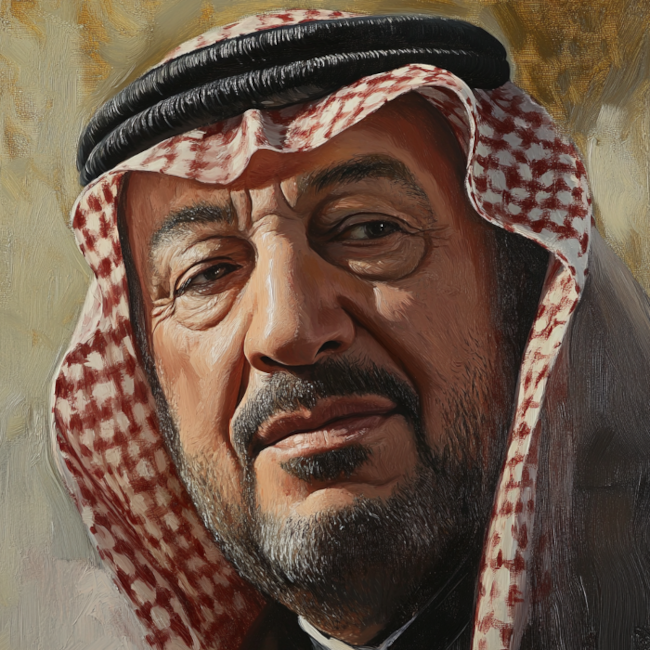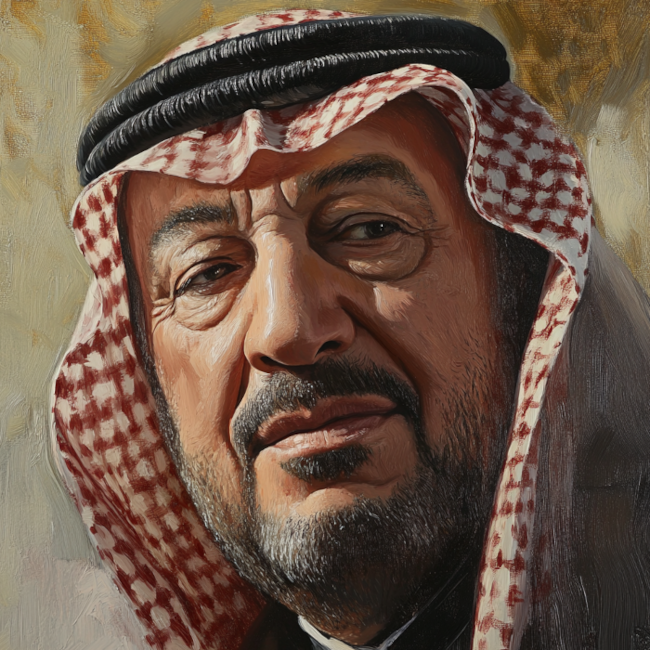


King Abdullah bin Abdulaziz Al Saud (1924–2015) was the King of Saudi Arabia and the Custodian of the Two Holy Mosques from 2005 until his death in 2015. He is remembered for his cautious but notable reform initiatives aimed at modernizing Saudi Arabia's society, economy, and governance while maintaining the kingdom's conservative Islamic values. Under his leadership, Saudi Arabia experienced significant changes, including improvements in education, women's rights, infrastructure development, and international diplomacy. Abdullah was known for his efforts to diversify the Saudi economy, modernize the state, and expand regional and global partnerships.
Birth and Family Background: King Abdullah was born on August 1, 1924, in Riyadh, Saudi Arabia. He was one of the sons of King Abdulaziz Al Saud, the founder of modern Saudi Arabia, and belonged to the influential Shammar tribe through his mother, Fahda bint Asi Al Shuraim. Abdullah was raised in the royal court and was given a traditional education, which emphasized religious studies and Arabic culture.
Positions Before Becoming King: Before ascending to the throne, Abdullah held several prominent roles within the Saudi government. In 1961, he was appointed Commander of the Saudi Arabian National Guard (SANG), a key military force responsible for protecting the royal family and maintaining internal security. In 1982, following the death of King Khalid and the ascension of King Fahd, Abdullah became Crown Prince and First Deputy Prime Minister. He served as de facto ruler from 1995 onwards, after King Fahd suffered a debilitating stroke, and formally became king upon Fahd's death in 2005.
Economic Development and Diversification: King Abdullah focused on economic diversification and reducing Saudi Arabia's heavy dependence on oil revenue. Under his reign, Saudi Arabia became a member of the World Trade Organization (WTO) in 2005, signaling a commitment to opening the economy to international trade and investment. Abdullah launched the King Abdullah Economic City (KAEC) as part of a broader effort to boost the private sector, create jobs, and promote industries outside of oil.
Education Reforms: A key aspect of Abdullah's modernization program was education reform. He significantly increased funding for education, both within Saudi Arabia and for students to study abroad. The King Abdullah Scholarship Program, launched in 2005, provided thousands of Saudi students the opportunity to study in universities across the world, particularly in the United States, the United Kingdom, and Canada. Abdullah also invested heavily in expanding the education system at home, including the establishment of the King Abdullah University of Science and Technology (KAUST) in 2009, a co-educational institution aimed at fostering scientific research and innovation.
Social Reforms and Women's Rights: While Saudi Arabia remained socially conservative during his reign, King Abdullah made efforts to improve women's rights and expand their role in public life:
Judicial and Bureaucratic Reforms: Abdullah undertook reforms aimed at improving judicial independence and modernizing the legal system. In 2007, he launched a judicial overhaul that included the establishment of new courts and improved training for judges. He also sought to streamline and modernize government bureaucracy, increasing transparency and efficiency in the civil service.
Healthcare and Infrastructure Development: King Abdullah invested heavily in expanding healthcare services, building new hospitals, and enhancing the quality of healthcare in Saudi Arabia. He also embarked on ambitious infrastructure development projects, including the expansion of Mecca's Grand Mosque and the Prophet's Mosque in Medina to accommodate the increasing number of pilgrims. Major transportation projects, such as the Haramain High-Speed Railway connecting Mecca, Medina, and Jeddah, were also initiated to improve travel for both citizens and pilgrims.
Role as a Regional Leader: King Abdullah sought to position Saudi Arabia as a leading power in the Arab world and played a major role in regional diplomacy. He worked to strengthen the Gulf Cooperation Council (GCC) and promoted greater integration among the member states. He was also instrumental in mediating conflicts and promoting stability across the region, including efforts to reconcile Palestinian factions and mediating between Lebanon and Syria.
Relations with the United States: Abdullah maintained a close relationship with the United States, a key ally of Saudi Arabia. The alliance focused on energy security, counterterrorism, and containing Iran's regional influence. Following the September 11, 2001 attacks, Abdullah worked with the U.S. to combat terrorism and undertook measures to counter extremist ideologies within Saudi Arabia. He met with multiple U.S. presidents, including George W. Bush and Barack Obama, emphasizing security cooperation and the importance of maintaining stability in the region.
Response to the Arab Spring: The Arab Spring uprisings of 2011 posed significant challenges to Saudi Arabia's regional influence. Abdullah responded by promoting stability and providing financial support to allied governments facing unrest, such as Bahrain, Jordan, and Morocco. He also introduced domestic measures to mitigate potential unrest within Saudi Arabia, including a $130 billion stimulus package to improve housing, healthcare, and employment opportunities for Saudi citizens. In Bahrain, Abdullah supported the deployment of Saudi troops to help quell protests against the ruling monarchy, emphasizing his commitment to maintaining stability in the Gulf region.
Relations with Iran and Regional Rivalries: Under Abdullah, Saudi Arabia's relationship with Iran remained tense, as the two regional powers vied for influence in the Middle East. Abdullah was concerned about Iran's growing influence in Iraq, Syria, Lebanon, and Yemen, and he worked to counterbalance Iranian power through alliances and support for opposing factions in regional conflicts. He also voiced concerns about Iran's nuclear program and supported international efforts to prevent Iran from acquiring nuclear weapons.
Israeli-Palestinian Conflict and the Arab Peace Initiative: King Abdullah played an active role in advocating for a resolution to the Israeli-Palestinian conflict. In 2002, while he was Crown Prince, he proposed the Arab Peace Initiative, which called for full normalization of relations between Arab countries and Israel in exchange for Israel's withdrawal from the occupied territories and the establishment of an independent Palestinian state. The initiative was endorsed by the Arab League but was never fully implemented, as it failed to gain traction with Israel.
Health Issues: King Abdullah faced various health issues during the latter part of his life, including back surgeries and other complications related to his advanced age. Despite his health challenges, Abdullah remained actively involved in the governance of the country until his death. In 2010, he underwent surgery in the United States for a herniated disc, and in subsequent years, his public appearances became increasingly limited.
Succession and Preparations for the Future: During his reign, King Abdullah took steps to ensure a smooth succession and maintain stability within the royal family. In 2012, he established the Allegiance Council, a body of senior princes tasked with determining the line of succession, to prevent disputes among the different branches of the royal family. Abdullah appointed his half-brother Prince Salman as Crown Prince in 2012 after the death of Crown Prince Nayef. Salman succeeded Abdullah as King upon his death.
Death: King Abdullah passed away on January 23, 2015, at the age of 90. He was succeeded by his half-brother Salman bin Abdulaziz Al Saud, who ascended the throne the same day. Abdullah's death was met with tributes from world leaders, who acknowledged his role in promoting stability in the Middle East and his efforts toward modernization and reform in Saudi Arabia.
Legacy of Cautious Reform: King Abdullah's legacy is defined by his efforts to modernize Saudi Arabia while maintaining its conservative Islamic traditions. His reforms were incremental but significant, particularly in the areas of education, women's rights, and judicial modernization. Although he faced resistance from conservative elements within Saudi society, Abdullah took meaningful steps to expand opportunities for women and open up the country to more diverse cultural and social influences.
Economic and Social Modernization: Abdullah's economic initiatives aimed to diversify the Saudi economy and reduce its dependence on oil, which laid the foundation for the more ambitious reforms that would follow under King Salman and Crown Prince Mohammed bin Salman. His investments in infrastructure, healthcare, and education helped improve the quality of life for Saudi citizens and prepared the country for the challenges of the 21st century.
Regional Leadership and Diplomacy: On the international stage, King Abdullah was seen as a respected and influential leader who played a key role in maintaining stability in the Gulf and the broader Arab world. He was a mediator and advocate for peace, as demonstrated by his Arab Peace Initiative, and sought to counter the influence of extremist groups and regional rivals like Iran. His leadership during the Arab Spring demonstrated his commitment to maintaining stability and supporting allied governments in the face of regional turmoil.
King Abdullah bin Abdulaziz Al Saud was a pivotal figure in Saudi Arabia's history, whose reign marked a period of cautious but meaningful reform and modernization. He sought to balance the country's traditional values with the need to adapt to a changing world, and his initiatives in education, women's rights, and economic diversification laid the groundwork for the transformation of Saudi Arabia in the years that followed. Abdullah's leadership in regional and international affairs helped maintain stability in the Middle East during a period of significant upheaval.
While his reforms were often measured and incremental, they represented a significant departure from the status quo, and his legacy continues to influence Saudi Arabia's trajectory today. As a leader, King Abdullah was widely respected for his dedication to improving the lives of his people and his efforts to guide Saudi Arabia through a time of change while maintaining its core identity.

We use cookies
We use cookies and other tracking technologies to improve your browsing experience on our website, to show you personalized content and targeted ads, to analyze our website traffic, and to understand where our visitors are coming from. Privacy Policy.